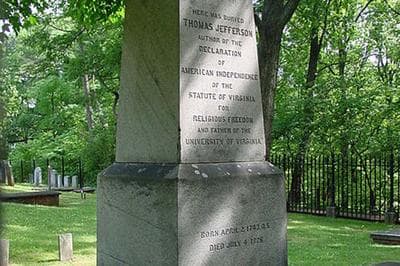Advertisement
'Jefferson's Qu'ran' And Islam In America
ResumeHow a founding father, Thomas Jefferson, came to understand Islam.

Back in the founding days of this nation, ideas were big. The rights of Man. Democracy, and citizenship. And of course, freedom of religion. But the religious debates were mostly among Protestants. Catholics and Jews were the outliers. Muslims? Well they were beyond the pale. The Ottoman, the Barbary pirate. And, lest we forget, the American slave. But a new book says Thomas Jefferson thought about Islam and could see a day when Muslims would be a part of the fabric of American democracy. This hour On Point: Thomas Jefferson, his Koran and Islam in American history.
Guests
Denise Spellberg, professor of history and Middle Eastern studies at the University of Texas at Austin. Author of "Jefferson's Qur'an: Islam And The Founders."
Rep. Keith Ellison (D-MN), member of the U.S. House of Representatives from Minnesota's Fifth District. First Muslim to be elected to the U.S. Congress. (@KeithEllison)
From The Reading List
San Francisco Chronicle: 'Thomas Jefferson's Qur'an,' by Denise Spellberg — "One of the strangest symptoms of our diseased political culture is the stubborn belief of some, despite all the contrary evidence, that President Obama is a Muslim. Slander and calumny are hardly new features of American politics. Usually it takes the form of an accusation that so-and-so is a socialist, or even a 'commie' - another fervid charge frequently leveled at our current president. But as it turns out, the accusation that he is a Muslim is a quality that Obama shares with one of his most illustrious predecessors, Thomas Jefferson."
The Daily Beast: How Islam Shaped the Founders — "Thomas Jefferson, a central figure in Spellberg’s book, had a strong, lifelong commitment to religious liberty. Jefferson rejected toleration, the alternative perspective and one embraced by John Locke and John Adams, as grounded on the idea that a religious majority has a right to impose its will on a religious minority, but chooses to be tolerant for reasons of benevolence. Religious liberty, Jefferson argued, denies the majority any right to coerce a dissenting minority, even one hostile to religion. Jefferson rejected using government power to coerce religious belief and practice because it would create a nation of tyrants and hypocrites, as it is impossible to force someone to believe against the promptings of his conscience."
New York Times: People Of the Book -- "Jefferson, studying law at the College of William and Mary, acquired an English translation of Islam’s sacred text. He never claimed that the Quran shaped his political orientation. Yet Spellberg, an associate professor of Middle Eastern studies at the University of Texas at Austin, makes a persuasive case for its centrality. To oversimplify: What began as an academic interest in Islamic law and religion yielded a fascination with Islamic culture, which disposed him to include Muslims in his expansive vision of American citizenship."
Read An Excerpt Of "Thomas Jefferson's Qur'an: Islam And The Founders" by Denise Spellberg
This program aired on December 9, 2013.